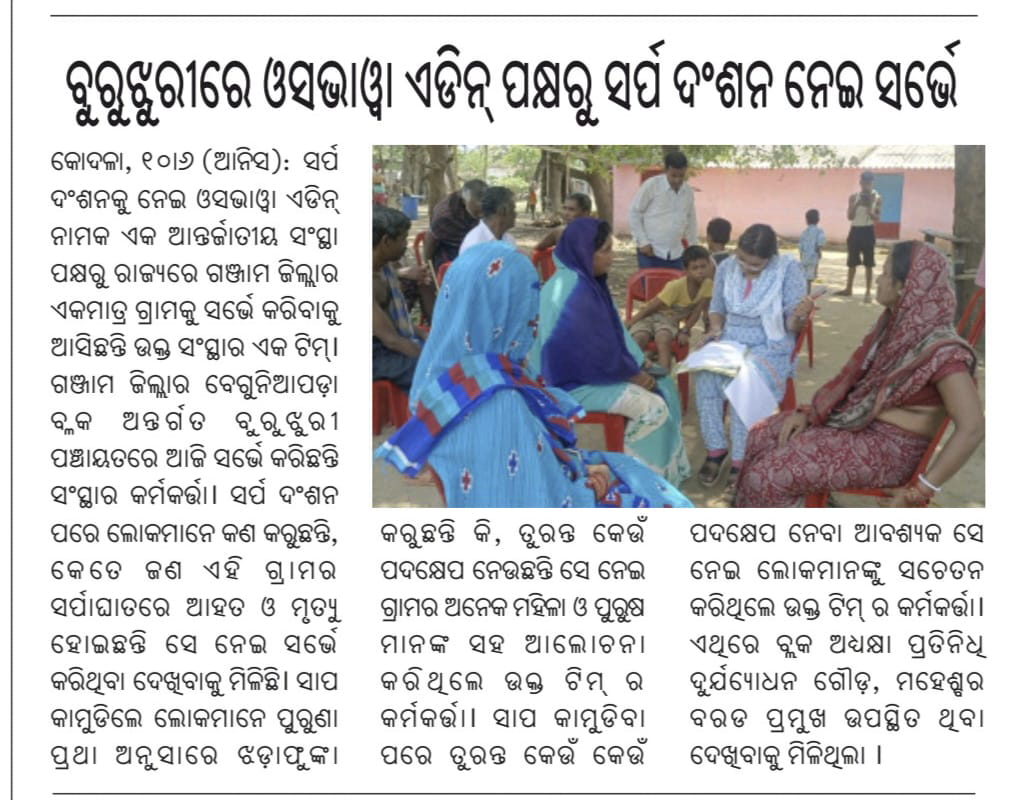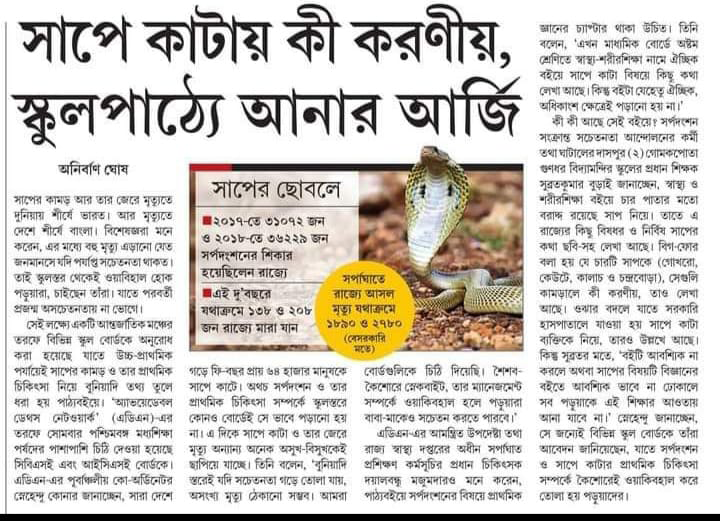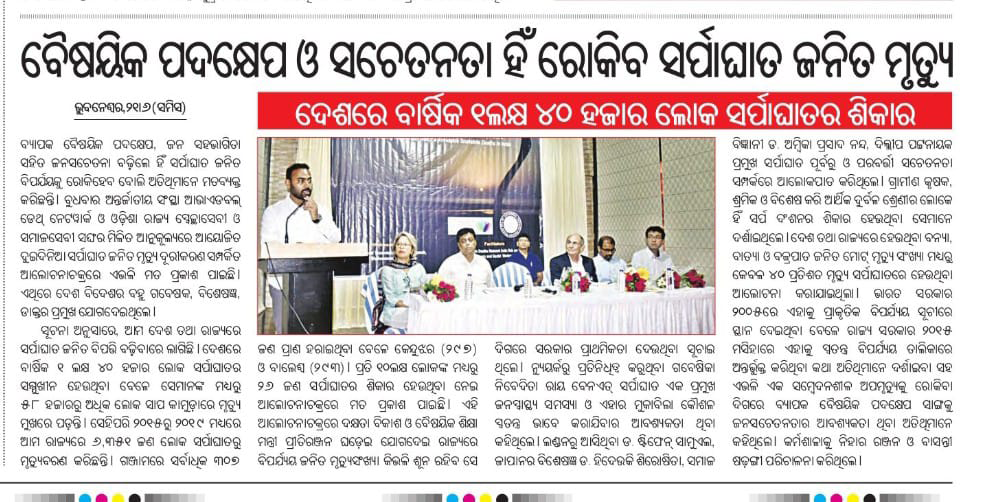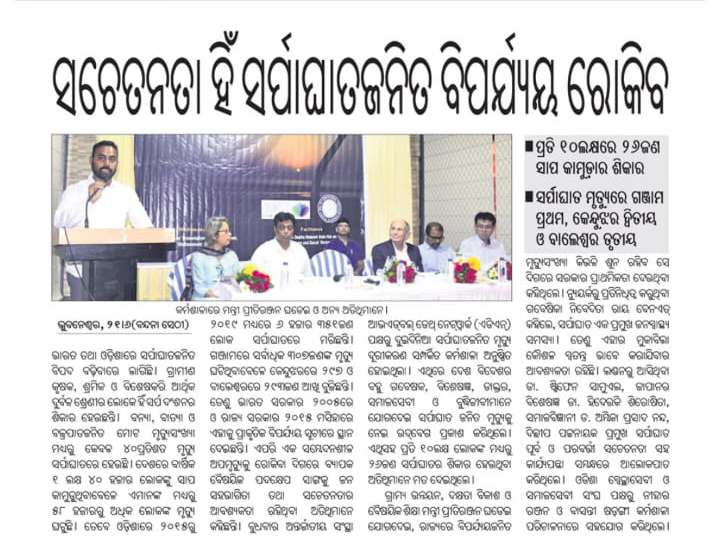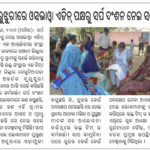DESCRIPTION
Full Title: Exploring the Feasibility and Value of Pioneering Partnerships to Reduce Avoidable Snakebite Deaths in India
Short Title: Avoidable Snakebite Deaths Project
Duration: January to August 2023
Objectives
The project objectives are:
- To identify all the key stakeholders who can reduce avoidable snakebite deaths across three states of India (Assam, Madhya Pradesh, Odisha) from the village to sub-district to district and state levels
- To engage with key stakeholders through a stakeholders’ symposium and consultations
- To explore the feasibility and value of a pioneering ‘Network to Reduce Avoidable Snakebite Deaths in India’ (NRSAD)
Context
A particularly pressing area of the opportunity for reducing avoidable deaths is snakebite deaths in India. Snakebite is a neglected tropical disease (NTD). It results from the injection of venom, a specialised toxic secretion into humans by the bite of a venomous snake. According to WHO (2021), about 5.4 million snakebites occur each year, resulting in 1.8 to 2.7 million cases of envenoming. India accounts for approximately half of all global snakebite deaths reported through traditional surveillance systems and is responsible for 2.97 million bites each year (Gutiérrez et al., 2017).
Unlike many other NTDs, snakebite is entirely avoidable through preventable, treatable interventions and governance (The Lancet, 2017; Nuñez, Alcoba and Warrell, 2019; Ray-Bennett and Sahoo, 2022). Eight Indian States, viz. Bihar, Jharkhand, Madhya Pradesh, Odisha, Uttar Pradesh, Andhra Pradesh, Gujarat and Rajasthan – carry the global burden of deaths and suffering.
In collaboration with more than 21 collaborators from India and beyond, this project aims to identify, map and assess the feasibility of context-specific key stakeholders to bring them into one networking platform in the next phase of this project to foster dialogue and discussions within and across the eastern and central Indian states; coordination, cooperation and communication amongst responders for resource sharing and response at local levels; identify scope for transformative research that combines social, medical and space sciences; and improve the capacity of local stakeholders.
In doing so the project aims to contribute to WHO’s Snakebite Envenoming Strategy for Prevention and Control which aims to i) halve the number of deaths and cases of disability by 2030; ii) empower and engage communities, iii) strengthen health systems, iv) increase partnerships, coordination, and resources (Nuñez, Alcoba and Warrell, 2019). Furthermore, this Strategy works in alignment with SDG 3.8, 3B-D, and in the context of this study through ‘Sendai Framework’s Targets A, B and E and climate change due to extreme weather events.
Collaborators
| No. | Institutions | People | Country |
| 1 | Avoidable Deaths Network | Ms. Lauren Macleod, Ms. Isha Biswas and Mr. Krishna Clarke | UK, Barbados |
| 2 | University of Leicester | Dr. Nibedita Ray-Bennett, Dr. Winifred Ekezie, Professor Heiko Balzter and Dr. Sarah Johnson | UK |
| 3 | PeerConnect | Mr. Steve Glovinsky | USA, India |
| 4 | Disaster Management Advice and Training (DMAT) Consulting KG | Professor Alois Hirschmugl | Austria |
| 5 | Kansai University | Dr. Hideyuki Shiroshita | Japan |
| 6 | Sheffield University | Dr. Christian Morgner | England |
| 7 | Foreign, Commonwealth & Development Office | Mr. Alexander Skinner | Denmark |
| 8 | All India Disaster Management Institute | Mr. Mihir Bhatt | India |
| 9 | Orissa State Volunteers Social Worker’s Association | Mr. Dillip Pattanaik | India |
| 10 | Tata Steel | Dr. Ambika Prasad Nanda | India |
| 11 | Kalahandi University | Dr. Madhulika Sahoo | India |
| 12 | Manitoba University | Ms. Nimisha Goswami | India |
| 13 | Doers | Ms. Anuradha | India |
| 14 | Zoological Survey of India | Dr. Pratyush Mohapatra | India |
| 15 | Indian Council of Medical Research | Dr. Amarendra Mohapatra | India |
| 16 | Indian Council of Medical Research – National Institute of Research in Tribal Health | Dr. Nishant Saxena | India |
| 17 | Demow Rural Community Health Centre | Dr. Surajit Giri | India |
| 18 | Snake Helpline | Mr. Subhendu Mallik | India |
| 19 | All India Institute of Medical Science | Dr. Sudipta Ranjan Singh | India |
Gatekeepers/ Convenors
| No. | Institutions | People | Country |
| 1 | Ophirex, Inc. | Dr. Stephen Samuel (Project Champion) and Dr. Matthew Lewin | UK and USA |
| 2 | Climate Resilient Observing-Systems Promotion Council | Col. Sanjay Srivastava | India |
| 3 | Amrita Institute of Medical Sciences and Research Centre | Dr. Jaideep Menon Dr. Manu Raj | India |
| 4 | Premium Serums | Dr. Milind Khadilkar | India |
| 5 | Madras Crocodile Bank Trust and Centre for Herpetology | Mr. Gnaneswar Chandrasekharuni | India |
| 6 | Himachal Pradesh State Institute of Health and Family Welfare | Dr. Omesh Bharti | India |
| 7 | EMRI Green Health Services | Dr. G.V. Ramana Rao | India |
| 8 | Bongaigaon Civil Hospital | Dr. Mir Mohibur Rahman | India |
| 9 | – | Mr. Vivek Sharma | India |
| 10 | – | Mr. Prasanna Kalita | India |
OUTPUTS
Highlight
Proceedings Report
Repository of Snakebite Information
The Repository of Snakebite Information will be regularly updated with reliable published information accrued from our stakeholders.
UPDATES
27 November 2023:
We are very pleased to share a press release on our Avoidable Snakebite Deaths in India project written by the University of Leicester.
Click here to read the article.

24 August 2023: Dr. Nibedita Ray-Bennett presented the project findings at the Venoms and Toxins Conference, University of Oxford. She made a case that snakebite deaths during disasters are avoidable deaths, and ADN’s knowledge exchange network (KEN) for ‘unknown issues’ and Local Level Action Network LAN) for ‘known issues’ for the high-risk groups at village level, can potentially lead to reducing avoidable snakebite deaths.
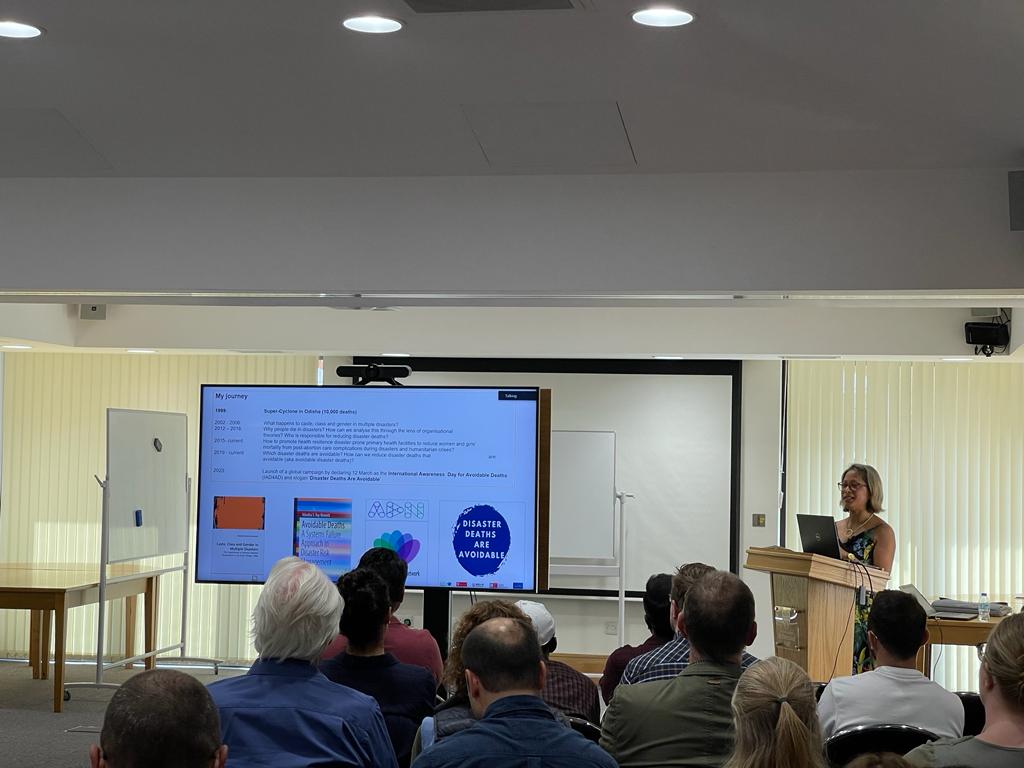
18 August 2023: The Proceedings Report for the Two-Day Symposium and High-Level Round Table Meeting was submitted to Mr. Pritiranjan Gharai – Honourable Minister of Rural Development, Skill Development and Technical Education of Odisha – per his request for actionable recommendations for the state of Odisha.
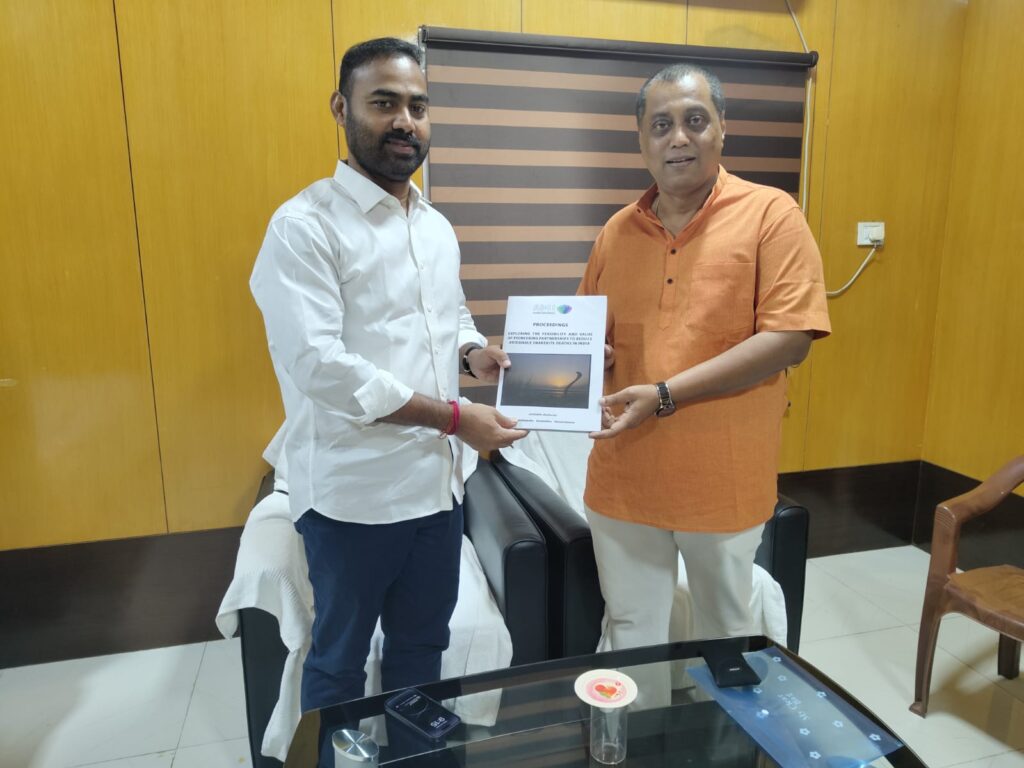
31 July 2023: The Repository of Snakebite Information has been published. Reliable sources of published snakebite information shared by our stakeholders will be regularly added.
22 July 2023: The Avoidable Snakebite Deaths Project has featured in 15 local news publications. To download the PDF, please click here.
21 July 2023: The Proceedings Report for the Two-Day Symposium and High-Level Round Table Meeting has been published. To download it, please click here.
14 July 2023: A Proceedings Report for the Two-Day Symposium and High-Level Round Table Meeting has been written and sent for peer-review.
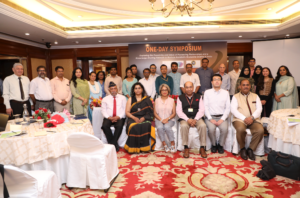
23 June 2023: The High-Level Round Table Meeting was organised in collaboration with Col. Sanjay Srivastava, Chairman of the Climate Resilient Observing-Systems Promotion Council (CROPC) and was held in the India Habitat Centre’s Maple Conference in New Delhi, India.

20 – 21 June 2023: The Two-Day Symposium: Exploring the Feasibility and Value of Pioneering Partnerships and a Knowledge-Sharing Network to Reduce Avoidable Deaths in India, which was organised in collaboration with the India Hub and Orissa State Volunteers and Social Workers Association (OSVSWA), took place in Bhubaneswar Odisha.
5 May 2023: The project was granted ethics approval by the University of Leicester School of Business Research Ethics Committee. Ethics Reference: 40507-nsrb1-ss/bu:m’ing,innov’,str’gy&ops,dept
27 April 2023: The upcoming events for the project have been announced:
- The Virtual Consultations will take place on 17, 18 and 25 May 2023. Three closed sessions will take place virtually with stakeholders in India, consisting of health care professionals, emergency service professionals and professionals concerned with public awareness, technical, financial and policy support, snake behaviours and environments, and anti venom issues. The aim of the consultations is to identify the issues of concern to professionals from different occupations and perspectives working towards the common goal of reducing #snakebite deaths in India.
- The Two-Day Symposium will take place on 20 – 21 June 2023. This Symposium will take place in Bhubaneswar, Odisha, India, facilitated by Mr. Dillip Pattanaik, Regional Coordinator, ADN Hub India Lead and Executive Director of the Orissa State Volunteers and Social Workers Association. Day One will host an open, full-day Symposium, consisting of i. Inaugural Session, ii. Risk Reduction Session, iii. Technical Session, iv. Non-Technical Session, and v. Closing Session. The Symposium will be held in hybrid format, with 100 participants invited to attend in-person. Day Two will host a closed Brainstorming Workshop with 20 participants, where the Community Leaflet and Roadmap will be the focus.
- The High-Level Round Table Meeting will take place on 23 June 2023. This meeting will take place in New Delhi, India, facilitated by Col. Sanjay Srivastava, Disaster and Climate Risk Management Expert within the Government of India, and Chairman of the Climate Resilient Observing Systems Promotion Council. This closed meeting will engage with Ministers and Government Officials on i. the findings of the Virtual Consultations and Two-Day Symposium, ii. Remark from In-House Technical Expert, and iii. Open Discussion and Soliciting Support.
28 March 2023: India’s Down To Earth published an article authored by Dr. Nibedita Ray-Bennett, Mr. Tom Caley and Dr. Stephen Samuel, entitled ‘Right anti-venom, given on time, can reduce snakebite deaths in India‘. To read the article, please click here.
23 March 2023: Dr. Nibedita Ray-Bennett met with Mr. Snehendu Koner, Dr. Stephen Samuel, Ms. Anuradha and Ms. Lauren MacLeod to wrap up the second phase of Stakeholder Mapping in Madhya Pradesh.
6 March 2023: Vinson Kurian wrote an article in The Hindu Business Line entitled ‘India to be focus of global campaign to prevent snakebite deaths‘ which promotes an article co-authored by Dr. Nibedita Ray-Bennett, Mr. Tom Caley and Dr. Stephen Samuel.
1 March 2023: The projects Technical Experts met with ADN Advisor, Mr. Steve Glovinsky to brainstorm categories of stakeholders based on the different perspectives in the community to reduce avoidable snakebite deaths.
28 February 2023: The first phase of Stakeholder Mapping for Odisha was completed and second phase of Stakeholder Mapping for Madhya Pradesh commenced.
21 February 2023: Dr. Nibedita Ray-Bennett held the third monthly meeting with collaborators. The meeting was oriented around he project implementation update and a review of progress towards objectives and outputs.
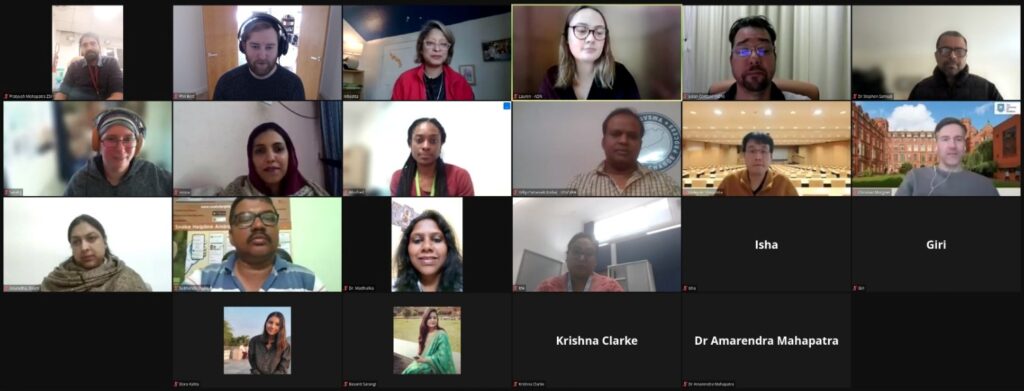
24 January 2023: Dr. Nibedita Ray-Bennett held the second monthly meeting with Dr. Winifred Ekezie, Dr. Sarah Johnson, Ms. Lauren MacLeod, Ms. Isha Biswas, Dr. Hideyuki Shiroshita, Dr. Christian Morgner, Mr. Krishna Clarke, Mr. Dillip Pattanaik, Dr. Madhulika Sahoo, Dr. Pratyush Mohapatra, Dr. Nishant Saxena, Dr. Amarendra Mohapatra, Dr. Surajit Giri, Mr. Subhendu Mallik, Mr. Phillip Best, Ms. Elora Kalita, Dr. Nimra Choudhary, Dr. Stephen Samuel, Ms. Basanti Sarangi, Mr. Julian Coetzee, Dr. Lutfa Ferdous and Ms. Anuradha. The meeting was oriented around the project implementation update and a review of progress towards objectives and outputs.
18 January 2023: Dr. Nibedita Ray-Bennett met with Ms. Lauren MacLeod, Ms. Isha Biswas, Mr. Dillip Pattanaik, Col. Sanjay Srivastava, Mr. Phillip Best, Ms. Elora Kalita, Mr. Subhendu Mallik, Dr. Nimra Choudhary, Dr. Aditya Ghosh, Ms. Nimisha Goswami, Dr. Stephen Samuel, Ms. Basanti Sarangi, Dr. Sudipta Ranjan Singh and Col. Sanjay Srivastava to discuss the method of stakeholder mapping in the Indian state of Odisha.
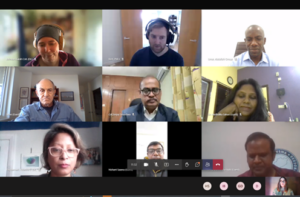
20 December 2022: Dr. Nibedita Ray-Bennett met with Dr. Sarah Johnson, Ms. Lauren MacLeod, Ms. Isha Biswas, Mr. Steve Glovinsky, Dr. Hideyuki Shiroshita, Mr. Abdullahi O. Umar, Mr. Dillip Pattanaik, Dr. Madhulika Sahoo, Dr. Nishant Saxena, Col. Sanjay Srivastava, Mr. Gurkaran Singh Bakshi, and Mr. Phil Best to discuss preliminary actions of the research project.
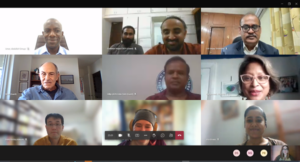
This meeting focused on getting to know project partners, implementation plan and one state and one district model to achieve the objectives, and scope to include new partners and organisations from the selective states and from other five high burden Indian states.
PRESS
To date, the project has been featured in 15 news articles. To download the PDF, please click here.
